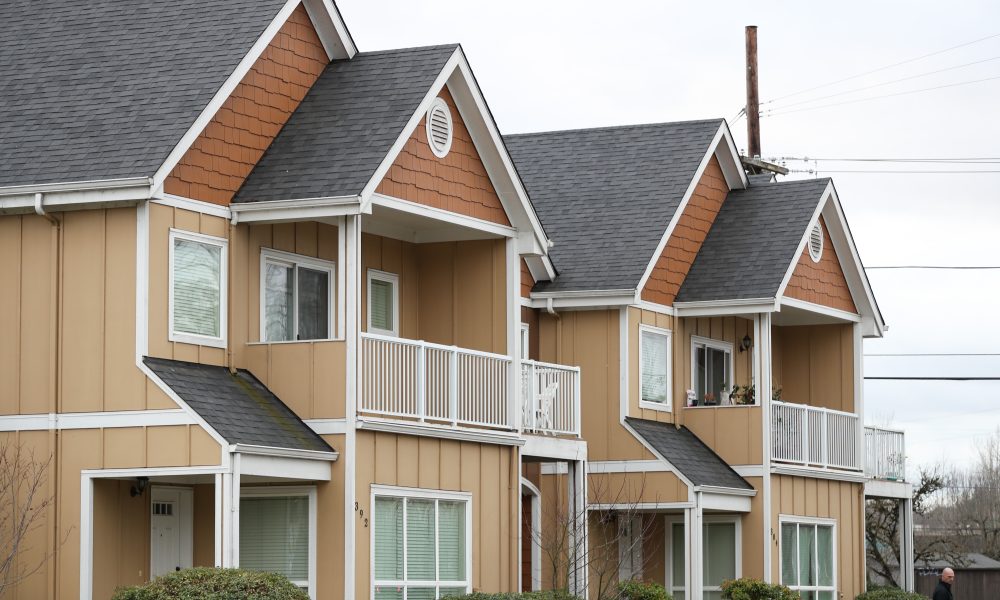Eight months ago, Gov. Tina Kotek was roaming the halls of the Oregon Capitol, trying to persuade just one more Democratic member of the Senate to pass her signature housing bill before the clock ran out on the 2023 legislative session.
But pressure from environmentalists who feared that Kotek’s single-minded focus on building more homes would pave the way for urban sprawl to take over prized farmlands and forests doomed the bill, which failed 15-10 in the Senate on the last day of the 2023 session. It was a rare political defeat for the first-term governor, who was used to wielding immense power during her nine years as the longest-serving speaker of the House in state history.
Eight months later, a new version of Kotek’s proposal in Senate Bill 1537 sailed through the Senate on a 21-7 vote, with most of the Democrats who opposed it last year supporting it now. Along with Senate Bill 1530, which passed the Senate on a 21-7 vote, and House Bill 4134, expected to come up for a vote in the next few days, it represents a $376 million investment in infrastructure funding, homebuilding, homeless shelters and rent assistance. The Senate bills now head to the House.
It would allow cities outside the Portland area to add up to 50 or 100 acres to their urban growth boundaries – the invisible state-approved line that dictates where and how cities can grow. Portland and its suburbs could add a combined 300 acres.
The bipartisan group of senators who voted for the housing package praised Kotek for her work with lawmakers and advocates to find agreements on the bill, especially when it came to the urban growth boundary. Cities will have to prove they need the new land and ensure at least 30% of homes built are affordable.
“We know that the best product comes from much input from both sides of the aisle, from urban and rural, and this bill reflects that,” said Senate Minority Leader Tim Knopp, R-Bend. “This has the best chance to help change the path that Oregon’s currently on, which is continued homelessness and disadvantaged Oregonians not having a place to lay their head at night that is warm and comfortable.”
Focus on infrastructure
Lawmakers are seeking more than $100 million for cities to use for infrastructure needs, including $94 million in Senate Bill 1530. It’s a fraction of the more than $800 million cities sought, according to Sen. Kayse Jama, D-Portland and chair of the Senate Housing and Development Committee.
The infrastructure projects that would be funded under the proposal span the state, including $3 million for Cottage Grove to install water, sewer and stormwater infrastructure on a 35-acre parcel it owns and $3 million for Siletz to upgrade its wastewater treatment plant.
But some senators objected to cities being left off the list. Sen. Daniel Bonham, R-The Dalles, said he felt like he was playing a shell game as he tried to seek the $5.9 million the city of Sandy needs to upgrade its water facilities. But no matter how hard he looked and how many items he turned over, he couldn’t find it.
“I don’t know the rules of the game anymore, and I want to advocate on behalf of a community that is stuck,” Bonham said. “The rules change depending on who’s playing, I guess, and I find that frustrating.”
Sen. Kim Thatcher, R-Keizer, said she disagreed with providing funding for specific projects instead of giving money to agencies that open grant applications. Many groups are doing good work but didn’t know how to get their projects included in the bill, she said.
“It cuts that off at the knees, and there was very little time to vet these projects closely with so much money going out there,” Thatcher said.
Jama told reporters after the bills passed that lawmakers hope to provide more funding in the long legislative session that begins in January, when the state will pass its budget for the next two years. They were short on both time and money this year as lawmakers balanced competing priorities around housing and behavioral health.
The $376 million is significantly less than the $600 million Kotek sought. Elisabeth Shepard, Kotek’s press secretary, said in an email Thursday morning that Kotek’s top priority remains “passing the strongest possible housing production policy and funding package this session.
“She is focused on accountability for the dollars in the infrastructure allocation to ensure that the funding is put toward projects that will increase housing production, consistent with the intent of the bill,” Shepard continued.
Expanding cities
Making it easier for cities to add more housing is a key part of Kotek’s proposal and one of the most controversial at the state Capitol. Democratic senators who previously opposed the measure did so because they feared that a section allowing cities a one-time opportunity to more easily expand their urban growth boundaries would lead to encroaching on farm and forestland.
Now, the proposal would limit urban growth boundary expansions to 50 acres in cities with less than 25,000 residents, 100 acres in cities with more than 25,000 residents and 300 total acres in the Portland metro – down from 75, 150 and 600 acres, respectively.
Cities would have 10 years to use the exception, and the bill limits eligibility to cities that haven’t expanded their urban growth boundary in the past 20 years, have developed the majority of the land in the urban growth boundary and prove they need affordable housing.
Kotek said this week that she may seek to loosen restrictions in the future depending on whether the bill succeeds in its goals, the agricultural publication Capital Press reported.
The new restrictions were enough to persuade several of the senators who previously opposed the proposal, including Sen. Sara Gelser Blouin, D-Corvallis. Gelser Blouin said some people in her district would be disappointed in her however she voted because of the potential for more developed land, but she said she felt good about supporting the proposal in its current form.
“Oregonians need a place to live,” she said. “Oregonians need shelter, and we do not have enough to keep people safe, warm and housed.”
Sen. Mark Meek, D-Gladstone, said he appreciates being able to drive in Oregon for hours without seeing a single home or person. The state’s land use laws protect it from the sprawl that plagues other Western states.
“Our land use laws are working,” he said. “There’s no urban sprawl going on. But we should be developing along our urban corridors and our urban boundaries.”
Other funding
The package also includes $75 million for a new revolving loan fund that cities could use to help pay for low- and moderate-income housing, targeted at people earning too much to qualify for affordable housing but too little to afford current home prices.
It would allocate $65 million to keep operating homeless shelters throughout the state that risk closing because of a lack of funding, ensuring thousands of Oregonians keep temporary roofs over their heads. And it would provide $34 million in rent assistance to keep more Oregonians in their homes.
The measure also sets aside $29 million for Portland-based organizations to purchase land for affordable housing, including $25 million for the Albina Vision Trust to buy the 10.5-acre Portland Public Schools headquarters in north Portland and redevelop it as affordable housing, parks and commercial space along the Willamette River.
And it includes $10.6 million to set up the Housing Accountability and Production Office to help local governments meet their housing goals. A law passed last year requires cities to plan for how they’ll meet housing needs and fulfill Kotek’s statewide goal of building 36,000 homes per year.
Oregon Capital Chronicle is part of States Newsroom, a network of news bureaus supported by grants and a coalition of donors as a 501c(3) public charity. Oregon Capital Chronicle maintains editorial independence. Contact [email protected].
STORY TIP OR IDEA? Send an email to Salem Reporter’s news team: [email protected].
SUPPORT OUR WORK – We depend on subscribers for resources to report on Salem with care and depth, fairness and accuracy. Subscribe today to get our daily newsletters and more. Click I want to subscribe!

Julia Shumway is deputy editor of Oregon Capital Chronicle and has reported on government and politics in Iowa and Nebraska, spent time at the Bend Bulletin and most recently was a legislative reporter for the Arizona Capitol Times in Phoenix. An award-winning journalist, Julia most recently reported on the tangled efforts to audit the presidential results in Arizona.










